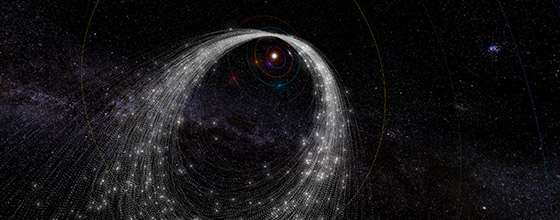At https://phys.org/print408108341.html … are impact craters laid down at random or is there a pattern. Do they occur periodically? This study suggests it is random.
At https://phys.org/print408183620.html … warped meteor showers mean that meteors can hit the earth's atmosphere at all angles. Such showers can also last for weeks, or months. The study is published in Planetary and Space Review (2017). It is thought the orbital effect of Jupiter is responsible for warping. See below.
 At https://phys.org/print408262120.html … tidal disruption is the subject – with two papers at http://arxiv.org/pdf/1703.00965.pdf and http://arxiv.org/pdf/1703.01299.pdf … tidal disruption events occur when a star passes close to a black hole and the star is pulled apart by the black hole's tidal forces. Stellar debris rains down on to the black hole and radiation emerges from the excreting debris. For astrophysicists TDEs are hopefully going to provide some answers about the formation and evolution of black holes. However, TDEs are thought to occur when luminous x-ray outbursts are seen. One of the studies showed no colour variation in its light curve and has a constant temperature of 30,000K.
At https://phys.org/print408262120.html … tidal disruption is the subject – with two papers at http://arxiv.org/pdf/1703.00965.pdf and http://arxiv.org/pdf/1703.01299.pdf … tidal disruption events occur when a star passes close to a black hole and the star is pulled apart by the black hole's tidal forces. Stellar debris rains down on to the black hole and radiation emerges from the excreting debris. For astrophysicists TDEs are hopefully going to provide some answers about the formation and evolution of black holes. However, TDEs are thought to occur when luminous x-ray outbursts are seen. One of the studies showed no colour variation in its light curve and has a constant temperature of 30,000K.
At https://phys.org/print408295249.html … black holes are hypothetical structures and are fair game. I'm fascinated by the language used when discussing them. This one has the headline, 'Hubble Dates Black Hole's Last Big Meal'. Whether black holes are real or not the projected activity really does happen – such as the x-ray emissions. The strong focus on food and chomping is what provides a surreal air to the discussion. Apparently, the black hole at the heart of our galaxy, the Milky Way, had a very strong energetic event which they date between 6 and 9 million years ago. Is it on a diet?
